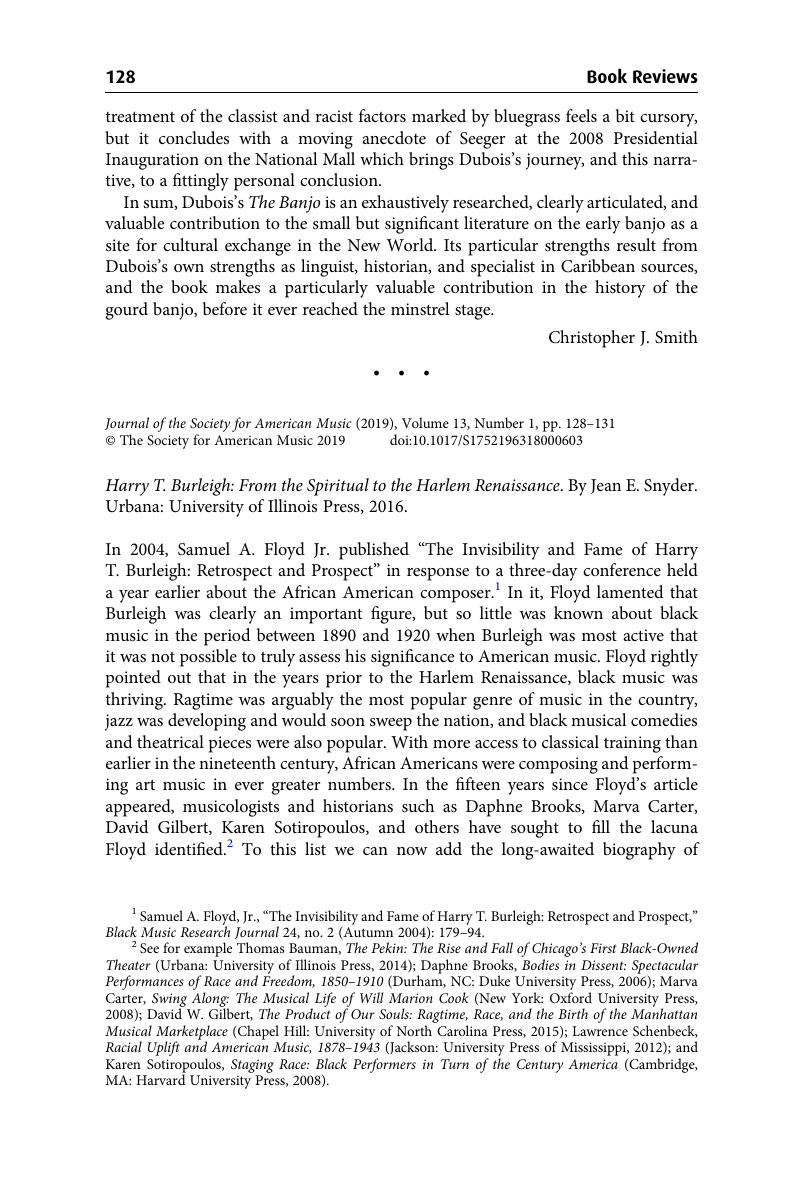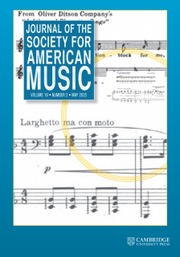No CrossRef data available.
Article contents
Harry T. Burleigh: From the Spiritual to the Harlem Renaissance. By Jean E. Snyder. Urbana: University of Illinois Press, 2016.
Published online by Cambridge University Press: 18 February 2019
Abstract

- Type
- Book Review
- Information
- Copyright
- Copyright © The Society for American Music 2019
References
1 Floyd, Samuel A. Jr., “The Invisibility and Fame of Harry T. Burleigh: Retrospect and Prospect,” Black Music Research Journal 24, no. 2 (Autumn 2004): 179–94Google Scholar.
2 See for example Bauman, Thomas, The Pekin: The Rise and Fall of Chicago's First Black-Owned Theater (Urbana: University of Illinois Press, 2014)CrossRefGoogle Scholar; Brooks, Daphne, Bodies in Dissent: Spectacular Performances of Race and Freedom, 1850–1910 (Durham, NC: Duke University Press, 2006)Google Scholar; Carter, Marva, Swing Along: The Musical Life of Will Marion Cook (New York: Oxford University Press, 2008)CrossRefGoogle Scholar; Gilbert, David W., The Product of Our Souls: Ragtime, Race, and the Birth of the Manhattan Musical Marketplace (Chapel Hill: University of North Carolina Press, 2015)CrossRefGoogle Scholar; Schenbeck, Lawrence, Racial Uplift and American Music, 1878–1943 (Jackson: University Press of Mississippi, 2012)CrossRefGoogle Scholar; and Sotiropoulos, Karen, Staging Race: Black Performers in Turn of the Century America (Cambridge, MA: Harvard University Press, 2008)Google Scholar.
3 Simpson, Anne Key, Hard Trials: The Life and Music of Harry T. Burleigh (Metuchen, NJ: Scarecrow Press, 1990)Google Scholar.
4 von Buseck, Craig, Nobody Knows: The Forgotten Story of One of the Most Influential Figures in American Music (Grand Rapids, MI: Baker Books, 2014)Google Scholar.
5 In addition to the sources listed in footnote 2, see Reed, Adolph Jr. and Warren, Kenneth W., ed., Renewing Black Intellectual History: The Ideological and Material Foundations of African American Thought (Boulder, CO: Paradigm Publishers, 2010)Google Scholar; Schmalenberger, Sarah, “Shaping Uplift through Music,” Black Music Research Journal 28, no. 2 (Fall 2008): 57–83Google Scholar; Southern, David W., The Progressive Era and Race: Reaction and Reform, 1900–1917 (Wheeling, IL: Harlan Davidson, 2005)Google Scholar; and Verney, Kevern, The Art of the Possible: Booker T. Washington and Black Leadership in the United States, 1881–1925 (New York: Routledge, 2001)Google Scholar. There are other monographs published since 2015, but these would not have been available to Snyder, so they are not included here.


